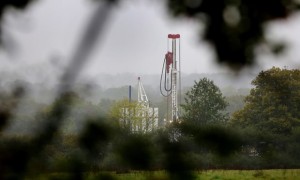 [posted by Rob Evans on The Guardian, March 7th, 2018] Another firm is seeking a sweeping injunction against environmental protesters, drawing accusations that the legal move is “draconian and chillingly anti-democratic”.
[posted by Rob Evans on The Guardian, March 7th, 2018] Another firm is seeking a sweeping injunction against environmental protesters, drawing accusations that the legal move is “draconian and chillingly anti-democratic”.
UK Oil and Gas (UKOG) has applied for a broad injunction to prevent campaigners from mounting protests that it says would unlawfully interfere with its operations.
The injunction, if granted by a judge, would cover all campaigners who organise protests at the firm’s three sites in the south-east of England where it wants to drill for oil. Anyone breaking the injunction faces being jailed, fined or having their assets seized.
The application, which is due to be heard at London’s high court on 19 March, has been condemned by campaigners who fear that corporate firms are increasingly attempting to use a heavy-handed legal weapon to close down dissent.
Keith Taylor, Green MEP for the region, said the move was “chillingly anti-democratic”. “This is an absolutely outrageous move by a firm that has no social licence for its environmentally destructive drilling operations, and instead is seeking a draconian injunction to bludgeon local people’s right to peaceful and lawful protest.”
Kevin Blowe of Netpol, a group monitoring the policing of protest, said it was “another attempt by the onshore oil and gas industry to stifle opposition and severely restrict the right to freedom of assembly. The sweeping nature of the injunction is extraordinary.”
He criticised UKOG’s attempt to prevent interference with what it called its “economic interests” – a term, he said, that “could mean almost anything.” He added: “The company seems to suggest that the only ‘acceptable’ protests are those that have no cost impact on its business and no effect on its share price.”
The move follows by a similar injunction that was granted against all anti-fracking protesters to petrochemicals giant Ineos in November. That injunction, which prohibits campaigners from interfering unlawfully with Ineos’s fracking operations, was opposed by two campaigners who said it was oppressive and restricted their fundamental rights to protest.
UKOG said it had been compelled to take “this serious legal action to protect itself, its supply chain and landlords from threats and unlawful conduct from activists, who are intent on preventing us from going about our lawful business.”
It said the injunction “does not prevent anyone effectively exercising their rights to freedom of assembly and freedom of expression.”
It said it was seeking an injunction against unlawful actions such as trespass and obstruction of the highway, as well as tactics used by protesters such as walking slowly in front of suppliers’ vehicles.
UKOG is seeking to extract oil in Sussex and Surrey, claiming there could be a huge number of barrels of oil – dubbed the Gatwick Gusher – at one site near the airport. However, doubts have been cast over the potential for the site at Horse Hill in Surrey.
Stephen Sanderson, UKOG’s chairman, said in its application that the firm had spent hundreds of thousands of pounds in recent years to ward off protesters.
The injunction, if granted, would cover UKOG’s sites at Broadford Bridge and Markwells Wood in Sussex as well as Horse Hill and its headquarters in Guildford, Surrey.
The use of injunctions by multinationals against protesters has fluctuated over the years, and has frequently been criticised.
When Ineos obtained its injunction in November, it disclosed that last May representatives of the fracking industry had met Metropolitan police officers including a secretive unit that monitors campaigners. The police had advised companies to obtain injunctions against protesters. The Met declined to release documents relating to this meeting when the Guardian submitted a freedom of information request.
